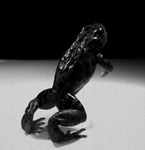Search - Research
301 - 310 of 774 results
-
A multi-stakeholder approach towards operationalising antibiotic stewardship in India's pluralistic rural health system
This study funded by the Medical Research Council, will aim at co-designing and piloting an intervention that generates an antibiotic (AB) stewardship programme to promote responsible use of ABs in West Bengal, India. This project will engage …This study funded by the Medical Research Council, will aim at co-designing and piloting an …
-
VetCompass study examines the association between neutering and idiopathic epilepsy in Labradors and Border collies
There is sparse published scientific data on the associations between neutering and the severity and survival of dogs with idiopathic epilepsy. This study used VetCompass™ data on 117 Labrador retrievers and 57 Border collies, diagnosed with … -
Made for the long jump: RVC study reveals how frogs use their unique skeletal anatomy to improve their jumping capabilities
RVC study reveals how frogs use their unique skeletal anatomy to improve their jumping capabilities -
The RVC’s Professor Joanne Webster awarded Royal Society medal
Joanne Webster FMedSci, Professor of Parasitic Diseases at the Royal Veterinary College (RVC), has been awarded a Royal Society Medal, The Leeuwenhoek Medal and Lecture, which recognises and celebrates outstanding contributions to science, for her ‘ …Joanne Webster FMedSci, Professor of Parasitic Diseases at the Royal Veterinary College (RVC), has …
-
These (human) feet are made for walking...
Dr Jim Usherwood contributes to a discussion on feet for the BBC World Service. Many of us may think of walking as simply putting one foot in front of another. Often overlooked are the mechanics of how we walk and what enables this. Dr Jim … -
Open source bone biology software benefits industry and academia
Open source image analysis software BoneJ developed at RVC being used in volcanology, marine biology, soils science, battery design, and food science -
Epidemiology - VetCompass
The currently high proportion of dogs that are brachycephalic suggests that issues around the health and population explosion associated with these breeds should be considered as a major welfare issue for dogs at a population level. -
Do long limbs really provide a leg up?
Musculoskeletal models reveal the impact of giraffe’s long limbs on its mobility. -
Incontinence in bitches: huge breed predispositions shown in VetCompass study
A new research study conducted by Vet Compass into urinary incontinence in dogs and particularly bitches of specific breeds. -
300 million-year-old animal reanimated as a robot
International group of scientists construct a robot, which is able to recreate how a 300 million-year old animal would have walked








